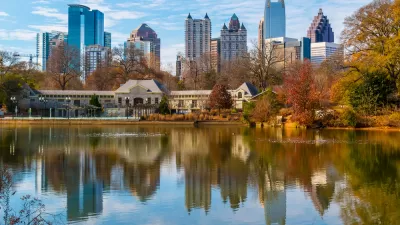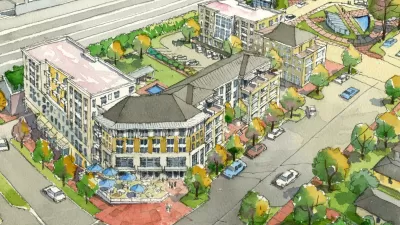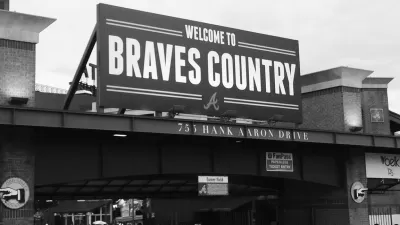Four developer teams have pitched competing visions for how to transform 55 acres of parking lots adjacent to Atlanta's baseball stadium into the city's next "hot intown neighborhood." J. Scott Trubey looks at the concepts.
For more than a decade, the "dreary swath of parking lots north of Turner Field" has inspired dreams of redevelopment, but so far to no avail. Now, in response to a request for ideas sent out by Invest Atlanta, the city's economic development arm, hopes are rising again that the 55 acre site could become a mixed-use sports and entertainment district with year-round activity.
This week the visions of four developer teams were relased by the development authority. "At the request of Invest Atlanta — which has a mission to fuel economic progress, help startup businesses, issue bonds for development and cultivate homeownership — each of the Turner Field proposals contains expansion of the downtown streetcar or other transit links, parking decks with at least 10,000 spaces, and a design theme to honor Hank Aaron’s home run record and the history of the Braves," notes Trubey.
While the ambitious concepts have been proposed by teams with strong track records in completing mixed use developments, Trubey cautions that "[t]he area has seen its chances at redevelopment rise and fall for decades with little to show for it. And the latest request for ideas is simply a starting point — developers’ dreams and proposals for how funding might happen that could one day shape a master plan or formal proposal process."
FULL STORY: Visions pitched for Turner Field parking lots

Alabama: Trump Terminates Settlements for Black Communities Harmed By Raw Sewage
Trump deemed the landmark civil rights agreement “illegal DEI and environmental justice policy.”

Planetizen Federal Action Tracker
A weekly monitor of how Trump’s orders and actions are impacting planners and planning in America.

The 120 Year Old Tiny Home Villages That Sheltered San Francisco’s Earthquake Refugees
More than a century ago, San Francisco mobilized to house thousands of residents displaced by the 1906 earthquake. Could their strategy offer a model for the present?

In Both Crashes and Crime, Public Transportation is Far Safer than Driving
Contrary to popular assumptions, public transportation has far lower crash and crime rates than automobile travel. For safer communities, improve and encourage transit travel.

Report: Zoning Reforms Should Complement Nashville’s Ambitious Transit Plan
Without reform, restrictive zoning codes will limit the impact of the city’s planned transit expansion and could exclude some of the residents who depend on transit the most.

Judge Orders Release of Frozen IRA, IIJA Funding
The decision is a victory for environmental groups who charged that freezing funds for critical infrastructure and disaster response programs caused “real and irreparable harm” to communities.
Urban Design for Planners 1: Software Tools
This six-course series explores essential urban design concepts using open source software and equips planners with the tools they need to participate fully in the urban design process.
Planning for Universal Design
Learn the tools for implementing Universal Design in planning regulations.
Clanton & Associates, Inc.
Jessamine County Fiscal Court
Institute for Housing and Urban Development Studies (IHS)
City of Grandview
Harvard GSD Executive Education
Toledo-Lucas County Plan Commissions
Salt Lake City
NYU Wagner Graduate School of Public Service





























